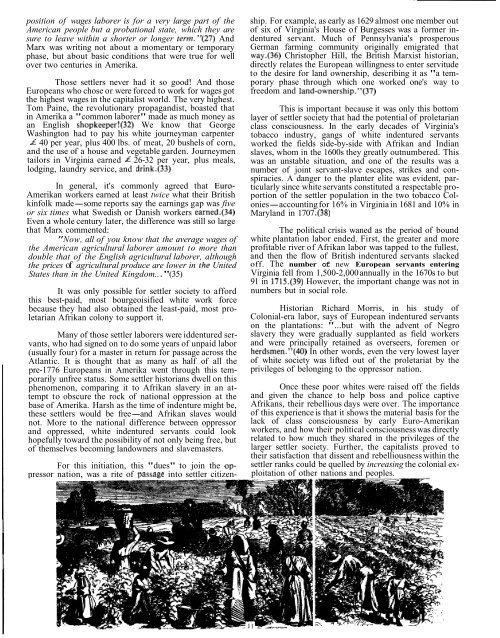Settlers - San Francisco Bay Area Independent Media Center
Settlers - San Francisco Bay Area Independent Media Center
Settlers - San Francisco Bay Area Independent Media Center
You also want an ePaper? Increase the reach of your titles
YUMPU automatically turns print PDFs into web optimized ePapers that Google loves.
position of wages laborer is for a very large part of the<br />
American people but a probational state, which they are<br />
sure to leave within a shorter or longer term."(27) And<br />
Marx was writing not about a momentary or temporary<br />
phase, but about basic conditions that were true for well<br />
over two centuries in Amerika.<br />
Those settlers never had it so good! And those<br />
Europeans who chose or were forced to work for wages got<br />
the highest wages in the capitalist world. The very highest.<br />
Tom Paine, the revolutionary propagandist, boasted that<br />
in Amerika a "common laborer" made as much money as<br />
an English shopkeeper!(32) We know that George<br />
Washington had to pay his white journeyman carpenter<br />
i€ 40 per year, plus 400 lbs. of meat, 20 bushels of corn,<br />
and the use of a house and vegetable garden. Journeymen<br />
tailors in Virginia earned i€ 26-32 per year, plus meals,<br />
lodging, laundry service, and drink.(33)<br />
In general, it's commonly agreed that Euro-<br />
Amerikan workers earned at least twice what their British<br />
kinfolk made-some reports say the earnings gap was five<br />
or six times what Swedish or Danish workers earned.(34)<br />
Even a whole century later, the difference was still so large<br />
that Marx commented:<br />
"Now, all of you know that the average wages of<br />
the American agricultural laborer amount to more than<br />
double that of the English agricultural laborer, although<br />
the prices of agricultural produce are lower in the United<br />
States than in the United Kingdom.. . "(35)<br />
It was only possible for settler society to afford<br />
this best-paid, most bourgeoisified white work force<br />
because they had also obtained the least-paid, most proletarian<br />
Afrikan colony to support it.<br />
Many of those settler laborers were iddentured servants,<br />
who had signed on to do some years of unpaid labor<br />
(usually four) for a master in return for passage across the<br />
Atlantic. It is thought that as many as half of all the<br />
pre-1776 Europeans in Amerika went through this temporarily<br />
unfree status. Some settler historians dwell on this<br />
phenomenon, comparing it to Afrikan slavery in an attempt<br />
to obscure the rock of national oppression at the<br />
base of Amerika. Harsh as the time of indenture might be,<br />
these settlers would be free-and Afrikan slaves would<br />
not. More to the national difference between oppressor<br />
and oppressed, white indentured servants could look<br />
hopefully toward the possibility of not only being free, but<br />
of themselves becoming landowners and slavemasters.<br />
For this initiation, this "dues" to join the opnressor<br />
nation, was a rite of Dassage into settler citizen-<br />
ship. For example, as early as 1629 almost one member out<br />
of six of Virginia's House of Burgesses was a former indentured<br />
servant. Much of Pennsylvania's prosperous<br />
German farming community originally emigrated that<br />
way.(36) Christopher Hill, the British Marxist historian,<br />
directly relates the European willingness to enter servitude<br />
to the desire for land ownership, describing it as "a temporary<br />
phase through which one worked one's way to<br />
freedom and land-ownership."(37)<br />
This is important because it was only this bottom<br />
layer of settler society that had the potential of proletarian<br />
class consciousness. In the early decades of Virginia's<br />
tobacco industry, gangs of white indentured servants<br />
worked the fields side-by-side with Afrikan and Indian<br />
slaves, whom in the 1600s they greatly outnumbered. This<br />
was an unstable situation, and one of the results was a<br />
number of joint servant-slave escapes, strikes and conspiracies.<br />
A danger to the planter elite was evident, particularly<br />
since white servants constituted a respectable proportion<br />
of the settler population in the two tobacco Colonies-accounting<br />
for 16% in Virginia in 168 1 and 10% in<br />
Maryland in 1707 .(38)<br />
The political crisis waned as the period of bound<br />
white plantation labor ended. First, the greater and more<br />
profitable river of Afrikan labor was tapped to the fullest,<br />
and then the flow of British indentured servants slacked<br />
off. The number of new European servants entering<br />
Virginia fell from 1,500-2,000 annually in the 1670s to but<br />
91 in 1715.(39) However, the important change was not in<br />
numbers but in social role.<br />
Historian Richard Morris, in his study of<br />
Colonial-era labor, says of European indentured servants<br />
on the plantations: "...but with the advent of Negro<br />
slavery they were gradually supplanted as field workers<br />
and were principally retained as overseers, foremen or<br />
herdsmen."(40) In other words, even the very lowest layer<br />
of white society was lifted out of the proletariat by the<br />
privileges of belonging to the oppressor nation.<br />
Once these poor whites were raised off the fields<br />
and given the chance to help boss and police captive<br />
Afrikans, their rebellious days were over. The importance<br />
of this experience is that it shows the material basis for the<br />
lack of class consciousness by early Euro-Amerikan<br />
workers, and how their political consciousness was directly<br />
related to how much they shared in the privileges of the<br />
larger settler society. Further, the capitalists proved to<br />
their satisfaction that dissent and rebelliousness within the<br />
settler ranks could be quelled by increasing the colonial exploitation<br />
of other nations and peoples.

















